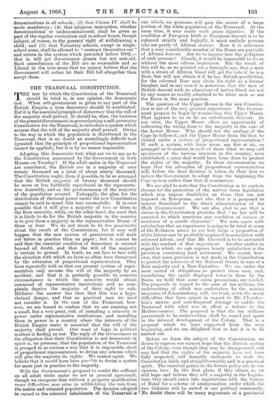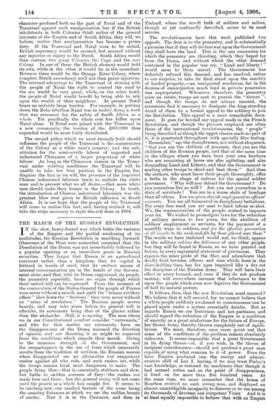THE TRANSVAAL CONSTITUTION. T HE test by which the Constitution of
the Transvaal should be tried is, in our opinion, the democratic test. When self-government is given to any part of the British Empire, a true democracy should be established. But it is the essential principle of democracy that the will of the majority shall prevail. It should be, then, the business of the present Government, in promulgating a self-governing Constitution for the Transvaal, to introduce a system which secures that the will of the majority shall prevail. Owing to the way in which the population is distributed in the Transvaal, that is no doubt an exceedingly difficult task (granted that the principle of proportional representation cannot be applied), but it is by no means impossible.
Adopting this democratic test, what are we to say as to the Constitution announced by the Government in both Houses on Tuesday ? If the adult males in the Transvaal are considered, the British are in a majority of over twenty thousand on a total of about ninety thousand. The Constitution ought, then, if possible, to be so arranged that the British majority of twenty thousand should be more or less faithfully reproduced in the representa- tive Assembly, and so the predominance of the majority of the population secured. Unhappily, the plan for the distribution of electoral power under the new Constitution cannot be said to stand this test successfully. It is even possible that it will give a majority of two or three to the Boer minority, while, on the other hand, the most that it is likely to do for the British majority in the country is to give them a majority in the representative House of three or four. We do not mean to be too pessimistic about the result of the Constitution, for it may well happen that the new system of government will work out better in practice than on paper ; but it cannot be said that the essential condition of democracy is secured beyond all doubt, and that the will of the majority is certain to prevail. In truth, we are face to face with the situation with which we have so often been threatened by the advocates of proportional representation. They have repeatedly told us that our present system of repre- sentation only secures the will of the majority by an accident, and that it is perfectly possible to conceive circumstances in which the minority would obtain command of representative institutions and so com- pletely deprive the majority of their right to rule. Hitherto the answer has been that this was a hypo- thetical danger, and that as practical men we need not consider it. In the case of the Transvaal, how- ever, we are bound to confess that we are running not a small, but a very great, risk of installing a minority in power under representative institutions, and installing them in power in a country where the interests of the British Empire make it essential that the will of the majority shall prevail. Our want of logic in political matters is finding us out. The reply of the Government to the allegation that their Constitution is not democratic in spirit is, we presume, that the population of the Transvaal is grouped in so curious a way that it is impossible, short of proportional representation, to devise any scheme which will give the majority its rights. We cannot agree. We believe that it would have been posgible to devise a system far more just in practice to the majority.
With the Government's proposal to confer the suffrage on all adult white males we are in general agreement, though we recognise that without a property qualification many difficulties may arise in withholding the vote from the native and coloured population. The decision adopted in regard to the coloured inhabitants of the Transvaal is one which, we presume, will gain the assent of a large portion of the white population of the Transvaal. At the same time, it may easily work grave injustice. If the condition of European birth or European descent is to be enforced strictly and logically, it must exclude persons who are partly of African descent. Now it is notorious that a very considerable number of the Boers are partially of African descent. Are we to inquire into the pedigrees of such persons ? Clearly, it would be impossible to do so without the most odious inquisition. But the result of this will be, as we pointed out a fortnight ago, that a man with a strain of African blood will get the vote if be is a Boer, but will not obtain it if he has British proclivities, for the coloured Boer may claim his right as a former burgher, and in any case it is notorious that the ineu of British descent with an admixture of native blood are not by any means so readily admitted to be white men as are the Boers in the same position.
The question of the Upper House in the new Constitu- tion is one of the very greatest importance. The Govern- ment propose to begin by nominating this Upper House. That appears to us to be an unfortunate decision. In our view, the Upper House offers an opportunity of redressing the wrong done to the majority in the case of the Lower House. r'Why should not the analogy of the Cape be followed, and the Upper House from the first be elected under a system of proportional representation ? If such a system, with large areas, say five or six, so arranged as to contain in each of them what we may call specimens of the various interests in the country, were established, a great deal would have been done to protect the rights of the majority. In these circumstances we hope that the advocates of proportional representation will, before the final decision is taken, do their best to induce the Government to adopt from the beginning the Cape system rather than that of nomination.
We are glad to note that the Constitution is to contain clauses for the protection of the natives from legislation which may impose disabilities on them that are not imposed on Europeans, and also that it is proposed to reserve Swaziland to the direct administration of the High Commissioner. We are also glad to see that a clause in the Constitution provides that "no law will be assented to which sanctions any condition of service or residence of a servile character." We note again with satisfaction that an experiment is going to be tried at some of the Robinson mines to see how large a proportion of white labour can be profitably employed in association with coloured labour, and that Mr. Creswell is to be entrusted with the conduct of that experiment. Another matter in regard to which we can express hearty satisfaction is the provision concerning land settlement. We regret, how- ever, that some provision is not made in the Constitution to protect the interests of the National Scouts in case of a Boer majority and a Boer Executive. We are under the most sacred of obligations to protect these men, and, considering the spirit displayed towards them by the Boers, we hold that some extra precautions are needed. The proposals in regard to the sum of ten millions, the underwriting of which was undertaken by the mining magnates of Johannesburg, will, we trust, settle the many difficulties that have arisen in regard to Mr. Chamber- lain's unwise and anti-Imperial attempt to saddle the Transvaal with what was in effect a tribute to the Mother-country. The proposal is that the ten millions guaranteed to be underwritten shall be raised and spent in the internal development of the Colony. That is a proposal which we have supported from the very beginning, and we are delighted that at last it is to be carried out.
Before we leave the subject of the Constitution, we desire to express our earnest hope that the British section of the Colony, even though they may be disappointed and may feel that the rights of the majority have not been fully respected, will honestly endeavour to work the Constitution fairly and straightforwardly and in a practical spirit. The essential points in the future policy are, in our opinion, two. In the first place, if they obtain, as we still hope and believe they will, a majority in the Legisla- ture, they should enter into negotiations with the Colony of Natal for a schetne of amalgamation under which the two Colonies will be united in one political community. No doubt there will be many arguments of a provincial character produced both on the part of Natal and of the Transvaal against such amalgamation, but if the British inhabitants in both Colonies think rather of the general interests of the Empire and of South Africa, they will, we believe, realise that amalgamation has become a prime duty. If the Transvaal and Natal were to be united, British supremacy would be secured, but secured without any injustice or injury to the Dutch. South Africa would then contain two great Colonies, the Cape and the new Colony. In one of these the British element would hold its own, while in the other it would be in the ascendant. Between them would be the Orange River Colony, where complete Dutch ascendancy need not then prove injurious. The internal advantage to the Transvaal of sharing with the people of Natal the right to control the road to the sea would be very great, while, on the other hand, the people of Natal would benefit by being able to rely upon the wealth of their neighbour. At present Natal bears an unfairly large burden. For example, in putting down the Zulu rebellion Natal was in reality doing a work that was necessary for the safety of South Africa as a whole. Yet practically the whole cost has fallen upon Natal alone. If Natal were joined with the Transvaal in a new community, the burden of the £600,000 thus expended would be more fairly distributed.
The second policy which we most strongly hold should influence the people of the Transvaal is the maintenance of the Colony as a white man's country, and the sub- stitution for the semi-servile labour of imported and indentured Chinamen of a larger proportion of white labour. As long as the Chinamen remain in the Trans- vaal under existing conditions the Transvaal will be unable to take her true position in the Empire, for, disguise the fact as we will, the presence of the imported Chinese indentured labourer tends to exclude the white man and to prevent what we all desire,—that more white men should make their homes in the Colony. In truth, the introduction of Chinese indentured labourers was the greatest blow ever given to British influence in South Africa. It is our hope that the people of the Transvaal will come to realise this fact, and, having realised it, will take the steps necessary to right the evil done in 1904.







































 Previous page
Previous page